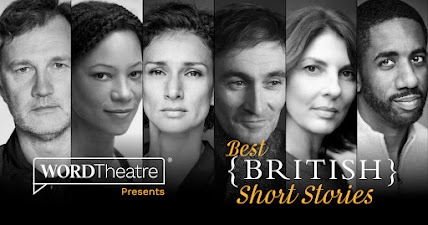I've been away from this blog for some time, at first because I was very involved in trying to get a new novel started - it's often for me the biggest part of writing a novel, finding the right structure and voice so the whole thing can take off: it takes up all my consciousness so that I can think of very little else, including getting the usual practical things of life done. Then I went down with Covid, and was pretty rough and have since been suffering exhaustion. During this time the novel pretty much slipped from my mental grasp, and I may be back to square one with it when I tackle it again.
Still, I'm getting some energy back now, which is just as well, as a couple of weeks ago I travelled to London to an exciting WORDTheatre event at the Crazy Coqs cabaret venue in London's Piccadilly, where my story 'Tides, Or How Stories Do or Don't Get Told' was read by the brilliant actor Nina Sosanya.
WORDTheatre was founded by the amazingly energetic producer Cedering Fox. The mission is to promote short stories by having them read by renowned actors at live events which are filmed for later screenings, with readings recorded for free podcasts. The event I attended was devoted to Salt's yearly Best British Short Stories, edited by Nicholas Royle, who was there to talk about the series. Five stories had been chosen by Cedering from out of the ten anthologies published so far. Alongside my story, which appeared in BBSS 2014, there were stories by Hilary Mantel, David Constantine, Hanif Kureishi and Courttia Newland, read by Nina, David Morrisey, Gina Bellman, Indira Varma, Derek Riddel and Rhashan Stone.
It was a really lovely evening in the very stylish Art Deco setting of Crazy Coqs, with musical interludes on the piano and violin. Nina read my story brilliantly, bringing out all the multiple meanings I had intended, with all of the emphases I'd had in my head as I wrote it, and I felt very moved.
Find out about WORDTheatre and membership here.
'Tides, Or How Stories Do or Don't Get Told' is included in Best British Short Stories 2014 and my own collection, Used to Be, both published by Salt.
















